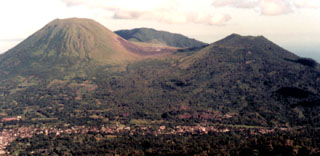Report on Lokon-Empung (Indonesia) — 3 February-9 February 2016
Smithsonian Institution / US Geological Survey
Weekly Volcanic Activity Report, 3 February-9 February 2016
Managing Editor: Sally Sennert.
Please cite this report as:
Global Volcanism Program, 2016. Report on Lokon-Empung (Indonesia) (Sennert, S, ed.). Weekly Volcanic Activity Report, 3 February-9 February 2016. Smithsonian Institution and US Geological Survey.
Lokon-Empung
Indonesia
1.3644°N, 124.7992°E; summit elev. 1580 m
All times are local (unless otherwise noted)
Although inclement weather sometimes obscured views of Lokon-Empung's Tompaluan Crater, PVMBG reported that during 1 December 2015-4 February 2016 observers at the post in Kakaskasen Tomohon (North Sulawesi, 4 km from the crater) saw white plumes rising as high as 400 m above the crater. Seismicity fluctuated but decreased overall. No deformation was detected. The Alert Level was lowered to 2 (on a scale of 1-4) on 5 February. Residents and tourists were reminded not to approach the crater within a radius of 1.5 km.
Geological Summary. The Lokong-Empung volcanic complex, rising above the plain of Tondano in North Sulawesi, includes four peaks and an active crater. Lokon, the highest peak, has a flat craterless top. The morphologically younger Empung cone 2 km NE has a 400-m-wide, 150-m-deep crater that erupted last in the 18th century. A ridge extending 3 km WNW from Lokon includes the Tatawiran and Tetempangan peaks. All eruptions since 1829 have originated from Tompaluan, a 150 x 250 m crater in the saddle between Lokon and Empung. These eruptions have primarily produced small-to-moderate ash plumes that sometimes damaged croplands and houses, but lava-dome growth and pyroclastic flows have also occurred.
Source: Pusat Vulkanologi dan Mitigasi Bencana Geologi (PVMBG, also known as CVGHM)

